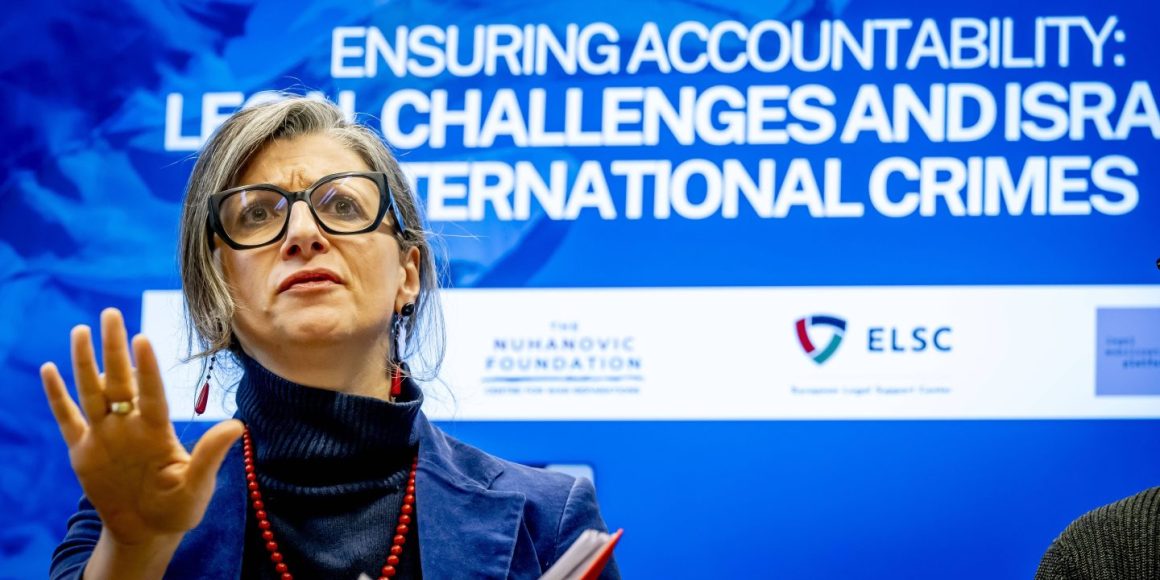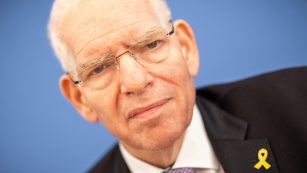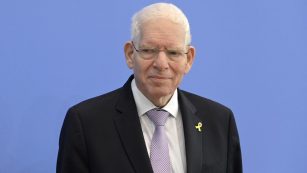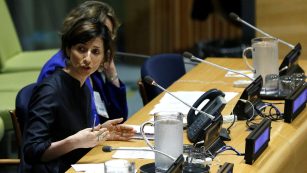She is not a UN official. Despite that, Francesca Albanese has become one of the most recognisable faces of the United Nations. And also one of the most controversial.
Appointed in May 2022 by the UN Human Rights Council as »Special Representative for the Occupied Palestinian Territories«, Albanese is obliged to be independent and non-partisan. She receives no financial compensation for her work. The position of »Special Rapporteur for the Occupied Palestinian Territories« was created in 1993. Albanese’s predecessors included the American Richard Falk and the Canadian Michael Lynk. Like her they were also not fond of Israel. Yet Francesca Albanese, who celebrates her 48th birthday this Sunday, has surpassed them in terms of media presence and impact.
Over the past three years, she has become widely known around the globe. Albanese is the »poster girl« of anti-Israeli groups worldwide and receives numerous invitations to speak. Her appearances in Munich and Berlin in February sparked counter-protests. Both the Ludwig Maximilians University in Munich and the Free University of Berlin cancelled events with her, which fueled even more media coverage. Wherever Albanese appears, media interest is huge.
Dutch opposition to reappointment
To become the anti-Israel movement’s most recognisable face within the UN bubble was not easy feat as the UN has long been a bastion of Israel critics. Albanese’s controversial statements include one in which she called the Gaza Strip »the largest and most shameful concentration camp of the 21st century«. She also accused the Jewish state of committing a genocide against the Palestinian people.
Next week, her tenure as Special Rapporteur was to be renewed for another three years. According to the UN statutes, the renewal is automatic unless an incumbent resigns or in case there are serious objections regarding possible violations of the code of conduct. If she secures a second mandate it would be Albanese’s last, because a six-year term limit applies.
The Council may yet have to debate the question. The reason is that Albanese has detractors among member states. After her harsh criticism of President Emmanuel Macron’s stance on Israel, she was publicly criticised by the French Foreign Ministry. The Dutch foreign minister announced on Wednesday that his government was opposed to a second term for Albanese. »Various statements by the Special Rapporteur are contrary to the Code of Conduct and are disapproved of by the Cabinet«, Caspar Veldkamp wrote in response to a question from members of the House of Commons.
World Jewish Congress: Albanese not impartial
The World Jewish Congress (WJC) is also opposed to an extension of Albanese’s tenure. WJC Executive Vice-President Maram Stern wrote a letter to the president of the UN Human Rights Council, Jürg Lauber, in which he said that Albanese had spread antisemitic clichés and repeatedly questioned Israel’s very legitimacy.
»Her persistent lack of objectivity and failure to uphold a balanced and impartial approach required of her as Special Rapporteur compromises her credibility as an independent expert. The World Jewish Congress strongly calls upon the Human Rights Council to reject the renewal of Ms. Albanese’s mandate. We urge the Council to immediately appoint a new Special Rapporteur whose embodies fairness, objectivity, and a genuine commitment to peace, justice, and the equal dignity of all peoples«, Stern wrote.
The Anti-Defamation League (ADL) also waded into the controversy. »Francesca Albanese consistently fosters antisemitic narratives and amplifies terrorist orgs like Hamas. Failure to address this issue violates guidelines and signals an unacceptable tolerance for antisemitism within the Human Rights Council and compromises the body’s credibility«, the organisation declared on Friday.
Hillel Neuer, executive director of the Geneva-based NGO UN Watch, also wrote to Lauber and called on the Council president, who is a Swiss diplomat, to refer the matter to the Council for a decision. Albanese’s violations of the Code of Conduct, Neuer said, were »widespread, systematic and grave.« Last autumn, UN Watch had published a report entitled »Wolf in sheep’s clothing« which detailed Albanese’s alleged misconduct.
German Foreign Office stays mum
Neuer bases his demand on a UN rule from 2008 (8/PRST/2). In it, the then president of the Human Rights Council stated that members of the body must be given all information that is brought to his attention, in particular regarding »cases of persistent failure by a mandate holder to comply with the provisions of Council resolution 5/2«, and in particular when the renewal of mandate holders is due.
It is still unclear whether Lauber will comply with that request. On Friday, Neuer expressed serious doubts. »The President of the UN Human Rights Council is reportedly planning to evade his legal duty to convey to the plenary our objection to the reappointment of Francesca Albanese (per HRC 8/PRST/2) by claiming that her violations of the Code of Conduct are not ‹persistent’.«
Israel has already lodged objections to the reappointment of Albanese. Asked about them, a spokesman for Lauber told Jüdische Allgemeine newspaper: »The President has received such communications, to date from the Permanent Mission of Israel and some NGOs.« He added: »The correspondence received is currently under consideration. Special Procedures mandate holders have always been tacitly renewed. There is no formal process for the Council to renew a mandate holder« though the spokesman stressed that Lauber as president was »serving at the pleasure of the Human Rights Council.«
According to diplomatic sources, the Argentine government is also opposed to Albanese. However, it is unclear how many other states will lodge complaints and ask for Albanese not to be reappointed. Equally unclear is the position of the German government. The Foreign Office in Berlin, which is headed by Minister Annalena Baerbock from the Green Party, did initially not provide answers to emailed questions. The ministry later clarified that the independence of special rapporteurs of the Human Rights Council would be respected. However, this would not prevent the German government from criticising Albanese’s problematic views, as it had done in the past, according to officials in the ministry.
Hillel Neuer criticised the German stance and pointed to the fact that the experts were appointed by the governments who sit on the Human Rights Council. »They are trying to wash their hands of responsibility. And give immunity and impunity to one of the worst antisemites in the world today.«
But Baerbock may have good reasons to stay mum. She wants to be elected president of the UN General Assembly this summer. And many UN member states might take offence if she were to speak out against Albanese.










